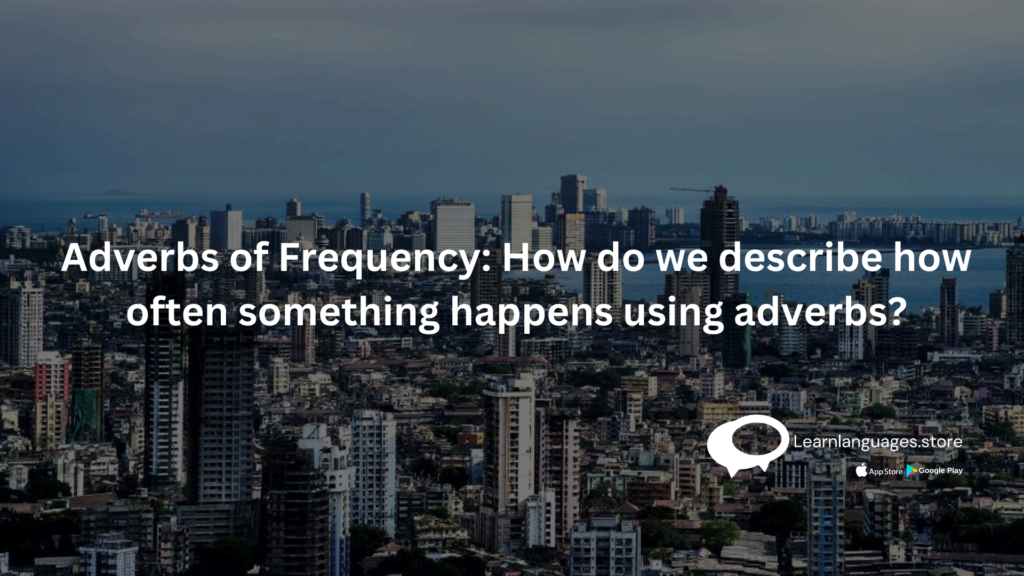Adverbs of Frequency: How do we describe how often something happens using adverbs?
Adverbs of Frequency: How do we describe how often something happens using adverbs?
Estimated reading time: 4 minutes

┬Ā
Introduction:
Adverbs of frequency play a crucial role in describing how often an action occurs in both English and French. These adverbs provide valuable information about the frequency of events, allowing for clear and precise communication. Understanding how to use adverbs of frequency effectively is essential for mastering both languages.
┬Ā
┬Ā
Examples:
Souvent (often):
Je vais souvent au cin├®ma. (I often go to the cinema.) – Pronunciation: Je vais souvent au cin├®ma. (Óż£Óźć ÓżĄÓźć ÓżĖÓżĄÓżŠÓżé Óżō ÓżĖÓźĆÓż©ÓźćÓż«ÓżŠ)
Il oublie souvent ses cl├®s. (He often forgets his keys.) – Pronunciation: Il oublie souvent ses cl├®s. (ÓżćÓż▓ ÓżēÓż¼Óż▓Óż┐ÓżÅ ÓżĖÓżĄÓżŠÓżé ÓżĖÓźćÓżĖ ÓżĢÓźŹÓż▓Óźć)
┬Ā
Rarement (rarely):
Je sors rarement le soir. (I rarely go out in the evening.) – Pronunciation: Je sors rarement le soir. (Óż£Óźć ÓżĖÓźŗÓż░ÓźŹÓżĖ Óż░ÓźłÓż░ÓźŹÓż«ÓżŠÓżé Óż▓Óźć ÓżĖÓźŗÓżåÓż░)
Elle mange rarement de la viande. (She rarely eats meat.) – Pronunciation: Elle mange rarement de la viande. (ÓżÅÓż▓ Óż«ÓżŠÓżüÓż£Óźć Óż░ÓźłÓż░ÓźŹÓż«ÓżŠÓżé Óż”Óźć Óż▓ÓżŠ ÓżĄÓż┐ÓżÅÓżéÓżĪ)
┬Ā
Parfois (sometimes):
Nous allons parfois au restaurant. (We sometimes go to the restaurant.)
Parfois, il fait beau en hiver. (Sometimes, it’s sunny in winter.)
┬Ā
Toujours (always):
Il est toujours en retard. (He is always late.)
Elle lit toujours avant de dormir. (She always reads before sleeping.)
┬Ā
┬Ā
Conditions and Exceptions:
Adverbs of frequency generally come before the main verb in a sentence. When used with the verb “├¬tre” (to be), the adverb usually comes after the verb. Some adverbs of frequency, like “toujours” and “parfois,” can sometimes come at the beginning or end of a sentence for emphasis. In negative sentences, the adverb usually comes after the negation word “ne… jamais” (never) or “ne… pas souvent” (not often).
┬Ā
┬Ā
┬Ā
IDENTIFYING IN A SENTENCE:
Identifying adverbs of frequency in a sentence is crucial for understanding how often an action occurs. Let’s look at some examples:
Example with “Souvent” (often):
“Je vais souvent au cin├®ma.” (I often go to the cinema.)
Here, “souvent” identifies the frequency of the action “going to the cinema,” indicating that it happens frequently or often.
┬Ā
Example with “Rarement” (rarely):
“Je sors rarement le soir.” (I rarely go out in the evening.)
In this sentence, “rarement” identifies the infrequent occurrence of the action “going out in the evening.”
┬Ā
Example with “Parfois” (sometimes):
“Nous allons parfois au restaurant.” (We sometimes go to the restaurant.)
The adverb “parfois” highlights the occasional nature of the action “going to the restaurant.”
┬Ā
Example with “Toujours” (always):
“Il est toujours en retard.” (He is always late.)
Here, “toujours” indicates the constant or continuous nature of the action “being late.”
┬Ā
┬Ā
┬Ā
Importance:
Understanding adverbs of frequency is essential for effective communication in French. They help convey routine, habits, and the frequency of actions, allowing speakers to express themselves more accurately.
┬Ā
┬Ā
Funny Examples:
“Il est toujours en retard. On dirait qu’il est sur un fuseau horaire diff├®rent!” (He is always late. It’s like he’s on a different time zone!)
“Elle mange rarement de la viande. Peut-├¬tre qu’elle est secr├©tement v├®g├®tarienne!” (She rarely eats meat. Maybe she’s secretly vegetarian!)
┬Ā
┬Ā
WANT TO LEARN MORE?:
Ready to become a master of French grammar and expression? Join our French A3 Level course at Learn Language Store! From adverbs of frequency to complex grammar structures, our course covers everything you need to know to speak French fluently. Enroll now and take the first step towards language mastery!
┬Ā
-
Product on sale
 French DELF B1
French DELF B1₹32,600.00
₹42,600.00 -
Product on sale
 French DELF A2
French DELF A2₹24,300.00
₹32,600.00 -
Product on sale
 French A1
French A1₹18,300.00
₹24,300.00
Learn Languages Store
Vashi,
Email: services@learnlanguages.store










